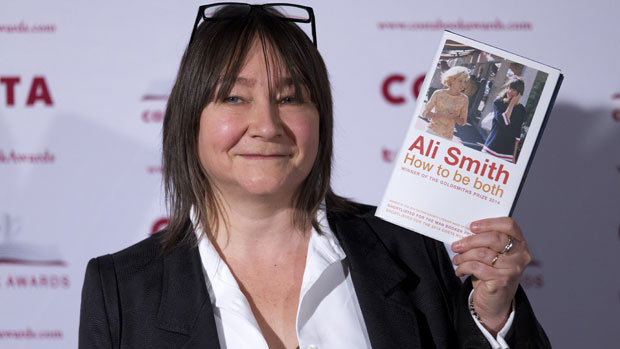How Ali Smith's 'experimental' book won the Baileys Prize
How to be Both author compared to James Joyce and Virginia Woolf for dual tale of teen and artist

A free daily email with the biggest news stories of the day – and the best features from TheWeek.com
You are now subscribed
Your newsletter sign-up was successful
Ali Smith has won the Baileys Women's Prize for Fiction for her novel How to be Both. The book, which weaves together the stories of a modern-day teenage girl and a Renaissance Italian artist, took the top prize, worth £30,000.
At the award ceremony last night Smith was compared by judges to James Joyce and Virginia Woolf, The Times reports. It was a case of third time lucky for Smith's book, which had previously missed out on the Man Booker Prize and Costa Book of the Year.
It was picked from a line-up that included Anne Tyler's A Spool of Blue Thread, Laline Paull's The Bees, Rachel Cusk's Outline, Kamila Shamsie's A God in Every Stone, and Sarah Waters' The Paying Guests.
The Week
Escape your echo chamber. Get the facts behind the news, plus analysis from multiple perspectives.

Sign up for The Week's Free Newsletters
From our morning news briefing to a weekly Good News Newsletter, get the best of The Week delivered directly to your inbox.
From our morning news briefing to a weekly Good News Newsletter, get the best of The Week delivered directly to your inbox.
How to be Both has been described as an experimental novel because it features two related stories that can be read in either order. One involves a modern teenage girl called George who struggles to cope with the death of her art-loving mother, while the other is about a cross-dressing Italian renaissance artist, Francesco del Cossa. The book was published in two editions – one beginning with the artist's story and the other with the girl's.
It was the third award for Smith's sixth novel, which has also picked up the Goldsmiths Prize and the Costa Novel Award.
Shami Chakrabarti, chair the judging panel, told The Independent that she had fallen in love instantly with How to be Both. "I felt like I was in the presence of a James Joyce or Virginia Woolf of our time," she said. "This is a great book that people will devour and explore and re-read long after I am dead."
Chakrabarti added: "There are universal themes about grief, loss, exploration of gender, but also contemporary issues like technology, surveillance, pornography. It is very, very accessible on the one hand, but also great art."
A free daily email with the biggest news stories of the day – and the best features from TheWeek.com
It's not the first time Smith has been compared to Virginia Wolf. Last year in the Daily Telegraph, Patrick Flanery wrote that "Smith is among Virginia Woolf's most gifted inheritors".
Flanery said Smith had followed Woolf's writerly advice that "one must be woman-manly or man-womanly", and her writing was "alive to the power of empathy as much as it is conscious of the importance of form".
But some critics warned that readers might find Smith's book confusing. Paul Dunn in The Times said: "Don't expect much in the way of revelation or resolution from these two mirrored stories. I have rarely enjoyed a novel so much, yet been so baffled by the end over what to think."
Meanwhile, Smith is about to embark on a new novel. She told the BBC she couldn't reveal the plot, but she hoped it would be part of a sequence of books she wanted to do over the next few years.
-
 Trump wants a weaker dollar but economists aren’t so sure
Trump wants a weaker dollar but economists aren’t so sureTalking Points A weaker dollar can make imports more expensive but also boost gold
-
 Political cartoons for February 3
Political cartoons for February 3Cartoons Tuesday’s political cartoons include empty seats, the worst of the worst of bunnies, and more
-
 Trump’s Kennedy Center closure plan draws ire
Trump’s Kennedy Center closure plan draws ireSpeed Read Trump said he will close the center for two years for ‘renovations’